
Ovidius University Annals of Chemistry
Scope & Guideline
Empowering Chemical Sciences Through Open Access.
Introduction
Aims and Scopes
- Environmental Chemistry:
Focus on the chemical processes occurring in the environment, including studies on pollutants, waste management, and the impact of chemicals on ecosystems. - Analytical Chemistry:
Development and application of analytical techniques for the detection and quantification of chemical substances, including methods like HPLC, GC-MS, and spectroscopic analysis. - Organic and Medicinal Chemistry:
Research on the synthesis, characterization, and biological evaluation of organic compounds, particularly those with potential pharmaceutical applications. - Food Chemistry and Nutrition:
Investigation into the chemical composition of food products, food safety, and the nutritional aspects of various ingredients and additives. - Materials Science and Engineering:
Exploration of novel materials, their properties, and applications, including polymers, nanomaterials, and composites in various engineering contexts. - Chemical Education:
Research aimed at improving the methods and practices of teaching chemistry, focusing on innovative pedagogical approaches and curriculum development.
Trending and Emerging
- Green Chemistry and Sustainability:
Increased focus on environmentally friendly chemical processes and materials, reflecting global priorities on sustainability and reducing environmental impact. - Health and Risk Assessment:
Growing emphasis on assessing health risks associated with chemical exposure, particularly in food, water, and environmental contexts, showcasing the journal's commitment to public health. - Nanotechnology Applications:
Emerging research on the applications of nanomaterials in various fields, indicating a trend toward exploring their potential benefits and risks. - Biochemical Analysis and Functional Foods:
Rising interest in the biochemical properties of food and natural products, particularly those with health benefits, aligns with the increasing consumer demand for functional foods. - Waste Valorization and Recycling:
Research focusing on the innovative reuse of waste materials and by-products into valuable resources is gaining traction, highlighting the importance of circular economy principles.
Declining or Waning
- Traditional Chemical Synthesis:
Research focusing solely on classical synthetic methods has decreased, likely due to the growing interest in greener and more efficient synthetic pathways. - Basic Inorganic Chemistry:
Studies that strictly cover fundamental aspects of inorganic chemistry are becoming less common, possibly overshadowed by more applied and interdisciplinary research. - Corrosion Science:
While still relevant, the frequency of publications solely focused on corrosion mechanisms and inhibition has waned, as researchers increasingly integrate these studies within broader materials science contexts. - Basic Toxicology:
Basic toxicological studies without a focus on practical applications or environmental implications are less frequently published, as the journal's scope shifts towards more applied research.
Similar Journals
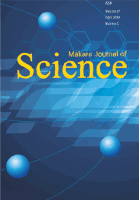
Makara Journal of Science
Advancing knowledge across diverse scientific disciplines.Makara Journal of Science, published by UNIV INDONESIA, is an esteemed open-access journal that has been contributing to the field of scientific research since 2007. With an ISSN of 2339-1995 and E-ISSN of 2356-0851, this journal plays a crucial role in disseminating knowledge across various disciplines including Agricultural and Biological Sciences, Biochemistry, Genetics and Molecular Biology, Chemistry, Materials Science, and Physics and Astronomy. The journal operates out of Depok, Indonesia, and aims to foster international collaboration and bridge the gap between theory and practice through high-quality research publications. As of 2023, it holds a Q3 ranking in Agricultural and Biological Sciences and Q4 in several other categories, reflecting its steady growth and dedication to quality. Researchers, students, and professionals can access a wealth of pioneering studies that not only deepen understanding in their respective fields but also broaden interdisciplinary dialogue within the global scientific community. Join your peers and contribute to the ongoing discourse in this vital area of scientific exploration.

Journal of Chemistry and Technologies
Unlocking Potential in Chemistry and Chemical Engineering.The Journal of Chemistry and Technologies, published by OLES HONCHAR DNIPROPETROVSK NATIONAL UNIVERSITY, is an open access journal dedicated to advancing knowledge in the broad fields of chemistry and chemical engineering since its inception in 2013. With ISSN 2663-2934 and E-ISSN 2663-2942, this journal provides a vital platform for researchers and professionals, particularly in Ukraine and beyond, to share innovative research findings and contemporary technological advancements. Currently ranked in the Q4 quartile in both Chemical Engineering and General Chemistry for 2023, it serves as an enriching resource for those interested in emerging trends and interdisciplinary studies within these domains. The journal adheres to high academic standards while fostering collaboration in the scientific community by offering open access articles that ensure visibility and accessibility to a global audience. As an important part of the academic landscape, the Journal of Chemistry and Technologies aims to inspire future research and development, paving the way for new discoveries and applications in chemistry-related fields.
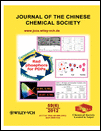
JOURNAL OF THE CHINESE CHEMICAL SOCIETY
Enriching the Global Dialogue in ChemistryJOURNAL OF THE CHINESE CHEMICAL SOCIETY, published by WILEY-V C H VERLAG GMBH, is a vital resource in the field of chemistry, focusing on a broad array of topics pertinent to general chemistry and its advancing sub-disciplines. Established in 1954 and running through 2024, this journal serves as a significant platform for the dissemination of high-quality research, showcasing innovative findings and developments within the chemical sciences. With its Q3 category ranking and positioning at Rank #203 in General Chemistry per Scopus, it reflects the journal's commitment to research excellence and impact. While not an open-access publication, it ensures accessibility to a global audience, making it an essential tool for researchers, professionals, and students alike seeking to stay informed and engaged in the evolving landscape of chemistry.

CHINESE JOURNAL OF CHEMISTRY
Elevating chemistry through rigorous scholarship.The CHINESE JOURNAL OF CHEMISTRY, published by WILEY-V C H VERLAG GMBH, is a distinguished peer-reviewed journal that has been contributing to the field of chemistry since its inception in 1990. With an impressive Q1 ranking in the Chemistry (miscellaneous) category and a Scopus rank of 67 out of 408, this journal is recognized for its rigorous scholarly standards and significant impact within the academic community. Renowned for publishing high-quality research, reviews, and insightful commentaries, the journal serves as a vital resource for researchers, professionals, and students keen on advancing their understanding of general chemistry and its applications. Although it does not offer open access, the journal remains an essential outlet for innovative chemistry research, attracting contributions from a global network of specialists. With its broad scope covering various aspects of chemistry and a commitment to fostering scientific dialogue, the CHINESE JOURNAL OF CHEMISTRY is poised to continue its role as a central pillar in the ever-evolving landscape of chemical sciences.
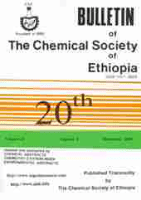
BULLETIN OF THE CHEMICAL SOCIETY OF ETHIOPIA
Empowering Global Research in Ethiopian ChemistryBULLETIN OF THE CHEMICAL SOCIETY OF ETHIOPIA (ISSN: 1011-3924; E-ISSN: 1726-801X), published by the Chemical Society of Ethiopia, serves as a pivotal platform for the dissemination of innovative research and developments within the field of chemistry. Since its inception in 1996 and now an open access journal since 2012, it has provided researchers, academics, and students with unrestricted access to critical studies and findings, thus fostering collaboration and the advancement of knowledge in the discipline. The journal's current standing in the Q3 quartile in the 2023 Chemistry category underlines its commitment to maintaining high academic standards, while its Scopus ranking, positioned at #250 out of 408 in general chemistry, showcases its growing influence and contribution to the scientific community. Hailing from Ethiopia and targeted toward a global readership, the journal aims to highlight local and international research, engaging scholars and practitioners alike in discussions that propel the science of chemistry forward.

Moscow University Chemistry Bulletin
Advancing Chemistry Through Innovative ResearchMoscow University Chemistry Bulletin is a distinguished academic journal dedicated to advancing the field of chemistry, published by PLEIADES PUBLISHING INC. With an ISSN of 0027-1314 and an E-ISSN of 1935-0260, this journal provides a platform for researchers, professionals, and students to explore a wide range of topics in general and specialized chemistry. While it holds a current Q4 ranking in the “Chemistry (miscellaneous)” category according to Scopus, the journal is committed to broadening its scope and visibility, aiming for greater impact in the global scientific community. Moscow University Chemistry Bulletin focuses on the publication of cutting-edge research, reviews, and discussions that stimulate innovation and collaboration. Although it is not an Open Access journal, it plays a crucial role in disseminating knowledge and fostering academic dialogue within the field, as it converges towards significant findings from 2004 to 2024. The continuous development of its content holds the potential to attract a diverse readership, making it a valuable resource for those involved in the chemical sciences.

REVUE ROUMAINE DE CHIMIE
Advancing Chemistry: Bridging Local Insights with Global ImpactREVUE ROUMAINE DE CHIMIE is a distinguished academic journal in the field of chemistry, published by EDITURA ACAD ROMANE in Romania. With an ISSN of 0035-3930, this journal has been a valuable platform for disseminating original research and insights in the diverse realm of chemistry since its inception. The journal currently operates under a competitive tier, categorized in Q4 for miscellaneous chemistry fields, as reflected in its Scopus ranking of #348 out of 408, placing it within the 14th percentile. Aiming to foster scientific discourse and innovation, the REVUE ROUMAINE DE CHIMIE provides a repository of knowledge that is crucial for researchers, professionals, and students eager to advance their understanding and contribute to the global chemistry community. By bridging local and international research initiatives, this journal plays an essential role in enhancing the visibility of Romanian scientific contributions on the world stage.
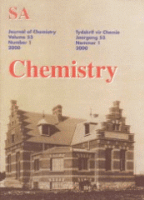
SOUTH AFRICAN JOURNAL OF CHEMISTRY-SUID-AFRIKAANSE TYDSKRIF VIR CHEMIE
Advancing Chemistry Through Open Access InnovationSouth African Journal of Chemistry (Suid-Afrikaanse Tydskrif vir Chemie), published by Bureau Scientific Publications, is a pivotal open-access journal that has been disseminating groundbreaking research in the field of chemistry since its inception in 1996. With an ISSN of 0379-4350 and an E-ISSN of 1996-840X, this journal serves as a vital platform for researchers and professionals seeking to share their work and engage with the global chemistry community. Recognized for its significant contributions, the journal holds a Q3 quartile ranking in the miscellaneous chemistry category as of 2023 and ranks #216 out of 408 in General Chemistry according to Scopus. The South African Journal of Chemistry is dedicated to advancing knowledge in the discipline by publishing a wide array of articles, reviews, and studies that address pertinent chemical research and applications. With open access options available since 2000, it fosters a collaborative environment, ensuring that research is accessible to all, thereby enhancing the visibility and impact of chemists' work across South Africa and beyond.
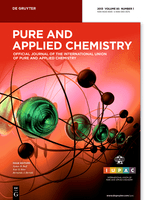
PURE AND APPLIED CHEMISTRY
Transforming Ideas into Chemical SolutionsPURE AND APPLIED CHEMISTRY is a highly regarded journal in the fields of chemical engineering and general chemistry, published by Walter de Gruyter GmbH. Since its inception in 1960, this journal has continued to foster advancements in chemical research and facilitate the dissemination of new knowledge through its rigorous peer-reviewed articles. With an impressive impact factor that places it in Q2 quartile rankings for both Chemical Engineering and Chemistry as of 2023, it holds a significant position in the academic landscape, attracting authors and contributors from around the globe. The journal’s unique focus on the practical applications of chemical research makes it indispensable for researchers, professionals, and students aiming to bridge theoretical knowledge with real-world applications. Although it is not open access, its impact is enhanced by its continued relevance and contributions to the ever-evolving field of chemistry. Researchers and practitioners alike will find in PURE AND APPLIED CHEMISTRY a critical resource for staying updated on key developments and innovative practices in chemistry and chemical engineering.

Moroccan Journal of Chemistry
Innovating Chemistry Research Through Open Access Excellence.Moroccan Journal of Chemistry, published by the University Mohammed Premier Oujda, serves as a pivotal platform for researchers and professionals in the field of chemistry, particularly focusing on diverse and emerging areas within the discipline. Established in 2018, this open-access journal facilitates widespread dissemination of scholarly articles, ensuring that cutting-edge research reaches a global audience. With an ISSN of 2351-812X and categorized in the Q3 quartile for miscellaneous chemistry in 2023, the journal maintains rigorous peer-review standards while fostering an inclusive environment for scientific dialogue. Located in Morocco, it aims to bridge local and international research communities, contributing to the advancement of knowledge in chemistry. As it continues to grow, the Moroccan Journal of Chemistry remains an essential resource for students, educators, and professionals eager to stay abreast of the latest developments in the field.